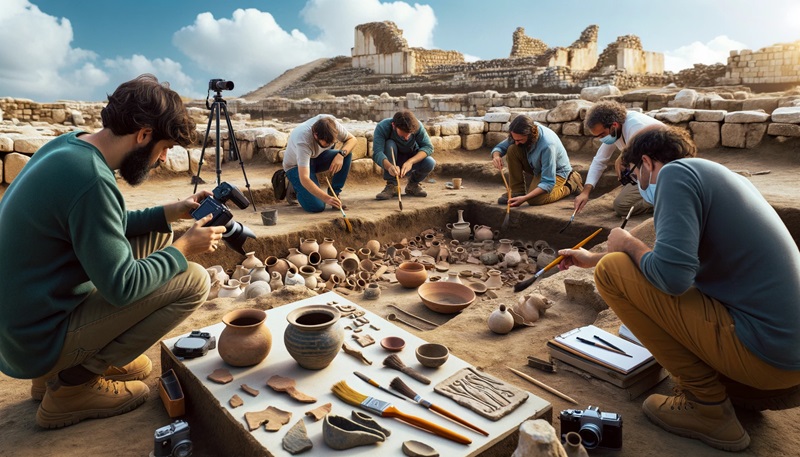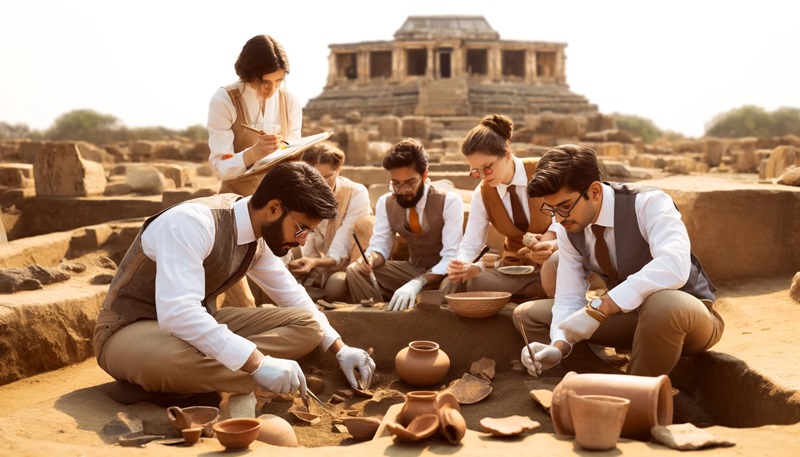How to Build a Career in Archaeology
Written by Prakriti Panwar, a first-year undergraduate student
An archaeologist’s job involves much more than just digging. Writing, research, statistics, and data analysis are all integral parts as well.
Written by Prakriti Panwar, a first-year undergraduate student
What is Archaeology?

According to Britannica, archaeology is defined as the study of the material remains of past human life and activities. If you want to study archaeology and want to know what is needed, here’s a quick look. We look at top archaeology schools in the world and the eligibility to study archaeology, among other things.
Archaeologists study all objects made by historic and prehistoric human beings that are buried. They then excavate, clean, sort, and analyze these objects to understand the past civilisations clearly.
What does Archaeology involve?

Archaeology is an interdisciplinary field that requires basic aptitude in math, science, English, and history.
An archaeologist’s job involves much more than just digging. Writing, research, statistics, and data analysis are also integral parts.
Skills and requirements to become an archaeologist

Archaeologists are expected to possess:
- Good management skills – they often manage the logistics of collecting artefacts, cleaning, and analyzing them at the site.
- Great communication skills – professionals must share their findings through written or spoken word to others.
- Archaeologists need to be comfortable using technology since computer-aided designs (CAD) and geographical information systems (GIS) are used to produce simulations and record data.
- Travel is also an essential part of the job, depending on the specific job one takes up.
Educational Requirements for Archaeology
The stream that one takes in grades 11 and 12 does not directly determine eligibility for an archaeology program.
That said, opting for humanities helps as it allows students to take up history, anthropology, geography, etc.
- Most archaeologists have an undergraduate degree (BA or BS) in anthropology or archaeology.
- However, to become an archaeologist in India, people can also get their bachelor’s degree in history, geography, or cultural heritage.
- Most institutions in India offer a degree in archaeology only at the post-graduate level.
Those keen on taking up archaeology from the very beginning can find good undergraduate programs in India.
Indian Colleges for Archaeology
| Rank | University | Location |
|---|---|---|
| 1 | Deccan College Post-Graduate and Research Institute | Pune |
| 2 | Institute of Archaeology, ASI | New Delhi |
| 3 | Banaras Hindu University | Varanasi |
| 4 | University of Calcutta | Kolkata |
| 5 | Maharaja Sayajirao University of Baroda | Vadodara |
| 6 | Aligarh Muslim University | Aligarh |
| 7 | Madras Christian College | Chennai |
| 8 | University of Kerala | Thiruvananthapuram |
| 9 | Visva Bharati University | Santiniketan |
| 10 | Karnataka University | Dharwad |
Here are some more:
- Rashtrasant Tukadoji Maharaj Nagpur University (BA in archaeology and museology)
- Delhi Institute of Heritage Research and Management (BA in Indian History Culture, and Archaeology)
It must be noted that to become a marine archaeologist, earning a bachelor’s degree in engineering is a prerequisite.
Requirements to Study Archaeology

Only a bachelor’s degree is not enough to pursue archaeology in India. A master’s degree is also required.
The admission criteria for pursuing a master’s in archaeology vary from college to college. While some institutions do not consider the major in which you earned your bachelor’s degree, others specify your eligibility. In addition to entrance exams, certain institutions also require interviews.
At the master’s level, it is recommended that a double degree in archaeology be undertaken and some other fields such as classical languages or history. This is because it also keeps one’s options open to getting into the academic field. Obtaining a PhD degree is advisable to become an academician.
To pursue a career in the Archaeological Survey of India (ASI) or another state/govt archaeological institution, earning a Postgraduate Diploma at the Institute of Archaeology is a necessity. The institute first releases a merit list, after which eligible candidates are called for a written test and viva.
Internships and Early Career in Archaeology

While one can work in archaeology immediately after obtaining their bachelor’s degree, they will be limited only to junior positions.
Field experience is important for succeeding in the field and pursuing higher education since some institutions need field experience for their master’s degree/Ph.D. eligibility. Most people usually do field work for 12-30 hours while obtaining their PhDs.
Countries like the US and Canada have dedicated ‘Field Schools’ that run courses for 2-8 weeks, wherein basic fieldwork and techniques such as site analysis, excavation, and survey methods are taught.
Top Global Archaeology Courses
| Rank (QSRanking 2024) | University | Country |
|---|---|---|
| 1 | University of Cambridge | United Kingdom |
| 2 | University of Oxford | United Kingdom |
| 3 | University College London (UCL) | United Kingdom |
| 4 | Harvard University | United States |
| 5 | Stanford University | United States |
| 6 | University of California, Berkeley | United States |
| 7 | Leiden University | Netherlands |
| 8 | Australian National University | Australia |
| 9 | University of Toronto | Canada |
| 10 | University of Tokyo | Japan |
There are a lot of Indian institutions that employ archaeologists, and the Architecture Survey of India is the most popular. Organizations like UNESCO also hire a lot of archaeologists and anthropologists.
Many public (and private) museums, universities, and research councils/organizations hire those working in related fields.
The specific organization’s job postings section on their website and the LinkedIn Job Search tool are some resources to get started.
Career Scope For Archaeologists
In India, a career in archaeology is promising because the country has several historical sites.
Apart from working as an archaeologist, those with an archaeology degree can work as museum curators, gallery curators, documentation specialists, historic building officers, heritage managers, lecturers, professional consultants, and more.
I Kid You Not now has a large readership across India and also parts of the world. If you want to write for us, you can submit your story here. You can also apply to become a news anchor. Apply here





Comments